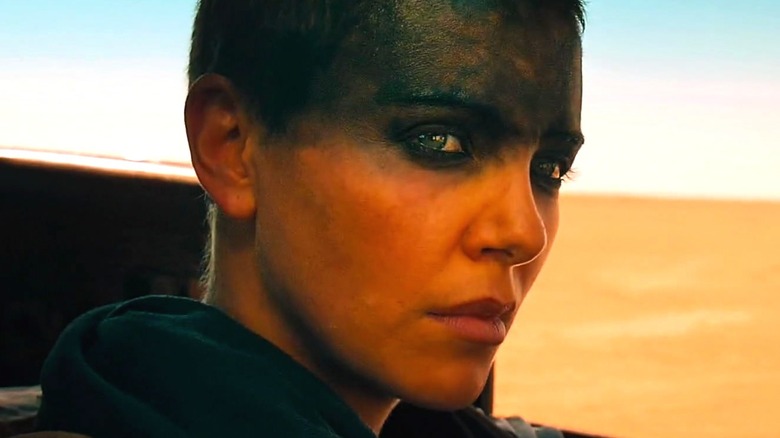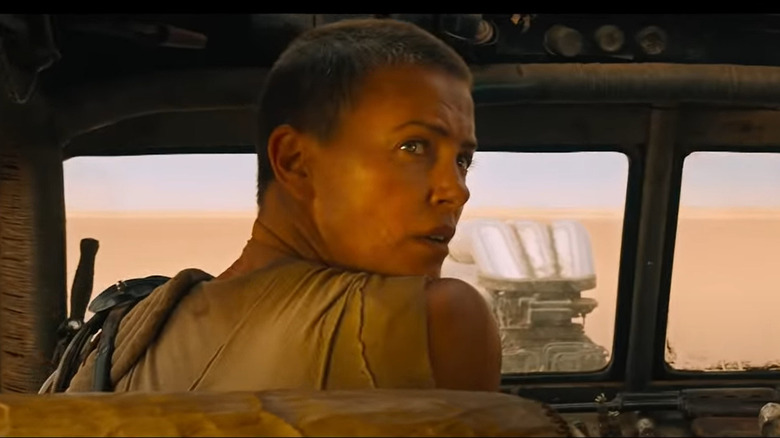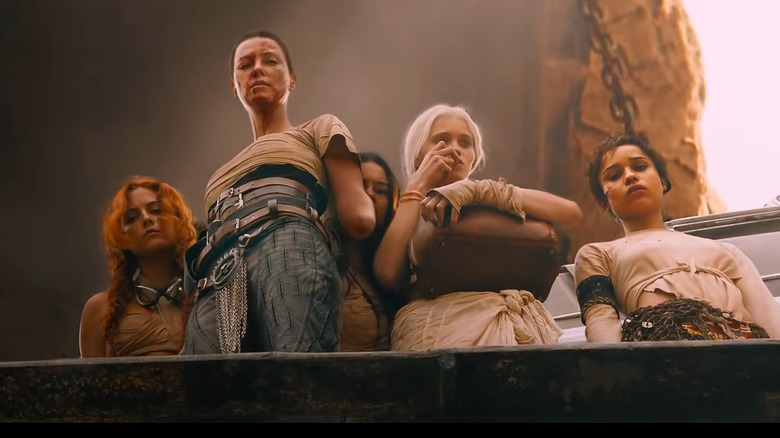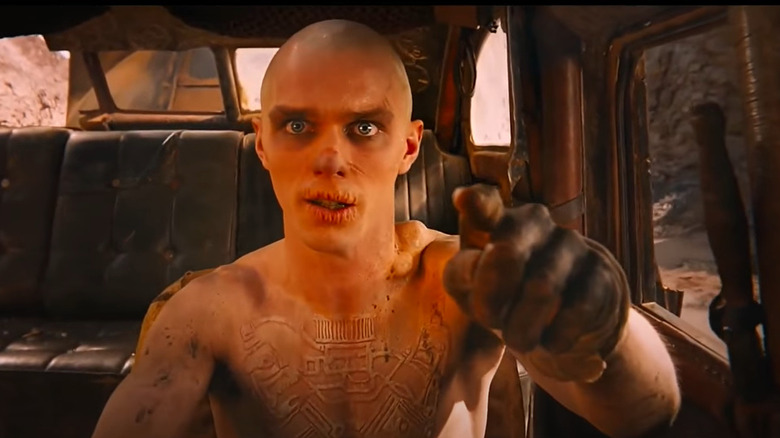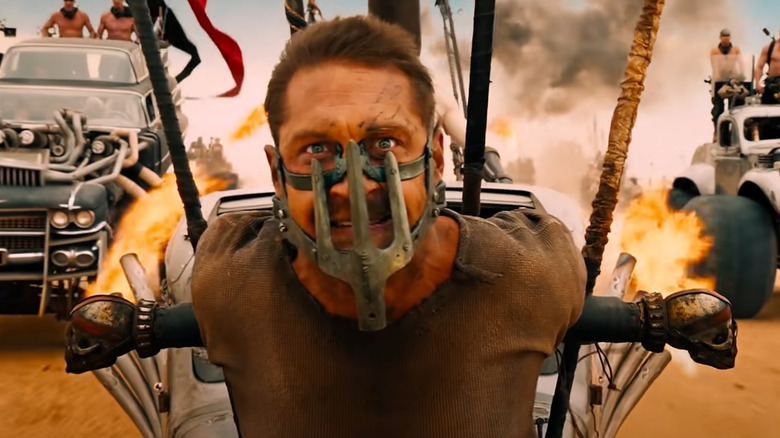The Ending Of Mad Max: Fury Road Explained
With 2015's "Mad Max: Fury Road," director George Miller didn't just reinvigorate his decades-old franchise. He created a film that was almost universally acclaimed by critics, with a Rotten Tomatoes score of 97% and a Metacritic "Universal Acclaim" rating of 90. Many consider it one of the greatest films of the 2010s and of the 21st century itself.
The post-apocalyptic action road movie wowed audiences and critics with its breakneck action sequences, outrageous stunts, beautiful cinematography, and flawless world-building. The film continues the adventures of the wandering hero "Mad" Max Rockatansky (Tom Hardy), a former cop whose family was murdered by a biker gang in the original "Mad Max" (1979), sending him spinning off on a path of violent vengeance.
"Fury Road" finds Max forming an unlikely alliance with Imperator Furiosa (Charlize Theron) and Nux the War Boy (Nicholas Hoult) as they flee across a desert landscape pursued by the maniacal army of dictator Immortan Joe (Hugh Keays-Byrne). An accurate summary of the plot would be: "There's a big car chase. Everyone turns around. There's a big car chase in the opposite direction." But Miller masterfully takes what reads on paper like a live-action "Wacky Races" episode and imbues it with enough complexity of character, plot, and theme to take the audience on a thrilling emotional journey to a truly cathartic resolution.
Furiosa finds redemption on the Fury Road
While "Fury Road" has several heroes, Imperator Furiosa is undoubtedly the film's protagonist. It's her action that initiates the plot, and she is the central character driving the story forward, absconding with Immortan Joe's "Five Wives" in the hope of finding freedom in the fabled "Green Place." Smart, strong, capable, and compassionate, Furiosa is the Wives' only hope of escaping a life of sex slavery in Joe's brutal regime. When the fortunes of Furiosa and Max are thrown together, both act on survival instinct and begrudgingly form an alliance to escape their pursuers.
Miller has featured strong female characters in previous Mad Max films, including the Warrior Woman (Virginia Hey) in "The Road Warrior" and Aunty Entity (Tina Turner) in "Beyond Thunderdome." But Furiosa is the first female in the franchise who achieves equal "road warrior" status with Max. Additionally, Charlize Theron was actively involved with Miller in the creation of the Furiosa character (via The New York Times). "Charlize arguably laid down the finest lead character in an action movie, and that credit is much deserved, in my opinion," Hardy said.
Reaching her destination Furiosa meets the Vuvalini, a female tribe from which she was abducted as a child. Dismayed to learn that the Green Place has long been destroyed, Furiosa agrees to Max's plan of returning to the Citadel when he says it could offer some kind of "redemption." As a former lieutenant in Joe's regime, Furiosa has been both a victim of, and complicit in, the violent subjugation of women and the oppression of the Citadel inhabitants. Furiosa achieves her redemption when, in the final chase, she kills Immortan Joe by ripping off his face apparatus, simultaneously losing her bionic arm. Furiosa returns to the Citadel a hero, free of her mechanical appendage and having recovered her humanity, ready to lead the Citadel to a new future.
The wives deliver a powerful message about the objectification of women
The so-called "Five Wives" of Immortan Joe — Angharad (Rosie Huntington-Whiteley), Capable (Riley Keough), Cheedo (Courtney Eaton), The Dag (Abbey Lee), and Toast (Zoë Kravitz) — have spent their lives locked in a chamber atop the citadel, existing purely to provide Joe with offspring. When Furiosa enables their escape, the Wives leave a message scrawled on their prison wall for Joe to find — "We are not things." But to Joe and his regime the women, also referred to as "breeders," are property, as are their children. Angharad is especially valuable because she's pregnant; when she's killed in the chase, Joe and his son Rictus Erectus (Nathan Jones) are devastated, not because they cared for her wellbeing, but because Joe's unborn child doesn't survive.
It's been noted that in "Fury Road", Miller has delivered one of the most powerful statements about the objectification and commodification of women in mainstream cinema, even though he didn't set out to do so. Once Miller realized what he had on his hands, he enlisted the help of playwright Eve Ensler, author of "The Vagina Monologues," to help the actresses relate to their characters (via The New York Times). Ensler workshopped with the actresses to explore their characters' past and their lived experiences, including exercises such as writing letters to their captor. It's something the actresses appreciated, according to Kravitz. "It was really important to George that we understood what we were running from," she said. "It would be easy to forget what we were doing if we didn't have this really great foundation that we could return to."
The "Wives" start out as helpless victims being smuggled to freedom by Furiosa. As their flight progresses, they learn to arm themselves and fight for their freedom as a unit, and are ready to initiate a new matriarchy in place of Joe's oppressive regime.
Nux asks us to witness his sacrifice for a noble cause
Nux starts out as just another War Boy, one of Immortan Joe's brainwashed zealots used as kamikaze weapons in his tyrannical dominion over the populace of the Citadel, and in his fight for control of resources. The Wives are also a resource to Joe, as they are to Nux, who is dispatched along with the other War Boys to take them back. Nux has been conditioned to view people as instruments, including Max, who he hooks up via a transfusion line as his "blood bag" like a piece of machinery to be drained.
Before leaping to their deaths in battle, the War Boys manically spray their faces chrome and demand that their comrades "witness this!" as they hope to die gloriously and "ride eternal" in Valhalla. A violent death in service to his overlord is the only future Nux knows. He is a "half-life" boy," riddled with a disease represented by the two huge tumors he dubs Barry and Larry. When Nux seizes his chance of glory by blowing up Furiosa's war rig, he flubs the attempt, and his failure is humiliatingly dismissed by Immortan Joe as "mediocre." Everything he knows is lost, including his hope for a glorious death and eternal life in Valhalla.
Nux's transformation is represented visually: he begins the film painted in the deathly skeletal white and blackened eye sockets characteristic of the War Boys and, as he bonds with his fellow travelers on the war rig, he gradually takes on a more human appearance. Bereft of his former existence, Nux finds companionship, respect, and purpose on the road. When he realizes he can save Furiosa, Max, and the Wives by wrecking the rig and blocking their pursuers in the canyon, Nux finally achieves his glorious death through sacrifice — this time in service to those he loves.
Max finds hope and humanity
One of the purest action films ever made, "Mad Max: Fury Road" is so stripped down it tells its story almost solely through visual means. There is virtually no expositional dialog or character backstory explanation, giving the audience the pleasure of discovering the world through visual clues, subtext, and action. This is particularly true of Max, who spends much of the film communicating in grunts, even refusing to share his name with Furiosa when they first team up. The meaning of Max's personal journey is to be found in the film's visual language, the actions he takes, and the choices he makes.
As Miller has said, Max begins the movie trapped in his own head, as well as being literally shackled by the War Boys. Haunted by visions from the past, Max can't afford hope, telling Furiosa that "hope is a mistake." He acts on pure survival instinct, unable to let his guard down and start caring for others, because of the risk of losing them as he lost those he loved in the past. Furiosa and the wives do have hope and as the film progresses, Max develops care for his fellow travelers and finally finds hope as well as redemption.
Max undergoes a homecoming of a different kind, effectively a return to his humanity. Dehumanized and commodified by the War Boys as a blood bag connected by a transfusion tube, he chooses to protect the Five Wives. In the film's climax, Max shares his name and his blood with Furiosa as he uses the same transfusion tube to save her life. True to the franchise, Max can't find a home in the Citadel; he's destined to wander alone on new adventures. But he has undergone a journey in Fury Road that has restored his humanity, dignity, and hope.
